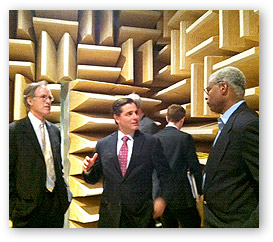
Chairman Genachowski at Consumers Union national headquarters in Yonkers, New York.
Last week, Chairman Julius Genachowski visited the Consumers Union (CU) national headquarters in Yonkers, New York. The headquarters is home to CU’s National Testing and Research Center, which includes extensive in-house laboratories where consumer products are tested. The organization also famously publishes Consumer Reports.
On the laboratory tour, Chairman Genachowski joined Jim Guest, CU CEO and Consumer Reports President, to watch CU’s expert testing team evaluate smartphones and 3D televisions, discuss acoustics in a sound testing lab, and tour a situational “living room,” in which trained consumers rate products in a true-to-life environment.
In addition to witnessing first-hand the testing labs at CU, Chairman Genachowski also discussed a number of consumer issues with the organization’s leadership, including, FCC initiatives to combat cell phone theft, prevent “bill shock”, and phone cramming and hidden fees on prepaid calling cards.
Consumer issues are a priority at the FCC. In the past few months, the FCC has introduced new consumer-oriented initiatives. This week, the FCC released an Enforcement Advisory on prepaid calling cards. A new study issued by Consumer Reports reveals that prepaid calling card schemes are remain a trap for unsuspecting consumers, often targeting low-income, minority, or immigrant communities. The FCC recently took aggressive enforcement actions against five of these companies, proposing a total of $25 million in monetary forfeitures for unfair and deceptive marketing practices.
Last month, Chairman Genachowski announced an initiative to combat cell phone theft, along with major police chiefs, Senator Chuck Schumer, D.C. Mayor Vincent Gray, and wireless carriers. Carriers agreed to develop a shared, centralized database that will record unique identifiers of stolen wireless devices to prevent their reuse.
The Commission unveiled a new “bill shock” website, which tracks carriers’ progress on providing their customers usage alerts to help them avoid data, text and roaming overages. “Bill shock” can happen when a subscriber is charged for unknowingly exceeding plan limits for data, voice, or text, or is traveling abroad and gets hit with unexpected international roaming charges. The FCC adopted rules to prevent “cramming” – the illegal placement of unauthorized charges on a consumer’s monthly phone bill. Most consumers don’t know when there are crammed charges on their bills. Crammers often avoid detection by charging a small amount to each consumer — as little as $1.99 per month — or describing charges in a manner that make them appear to be for services from the phone company, such as voicemail or web services. Unauthorized charges often go undetected for months or even years.